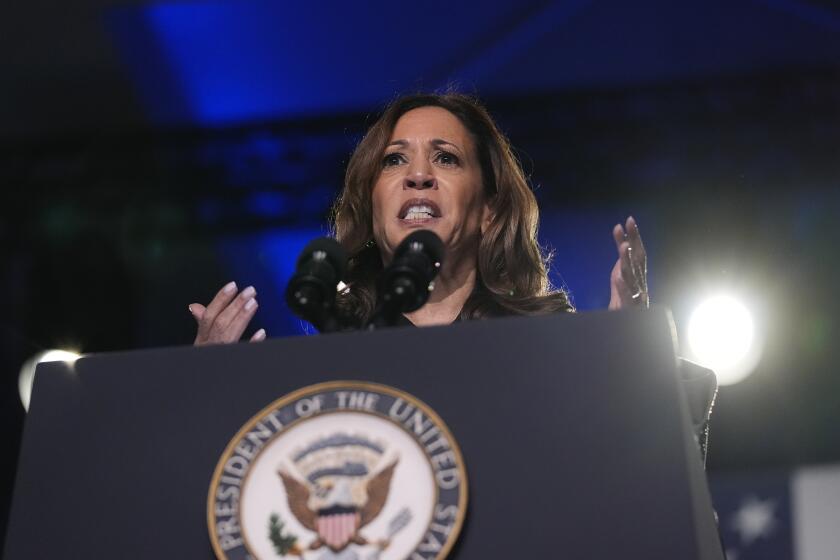British Muslim Leaders Facing Generation Gap
You don’t get much more mainstream than Muhammed Abdul Munim. After emigrating from Bangladesh as a boy, he earned a master’s degree in management and now gets up at 6 a.m. to work as a currency trader for JP Morgan.
Yet even Munim, 24, gets hot under his dress-white collar about what he sees as the failure of an older generation of Muslims to stop mistreatment of co-religionists around the world. And, he warns, the elders will continue to get an earful from the emerging young generation.
“The trend, to be honest, is you’ll find that people younger than me will carry a harsher tone,” Munim said. “If you go down the age groups, the views become more and more extreme.”
As if London’s Muslim community hasn’t had enough to worry about after a year of terrorist bombings and arrests, add this: a widening generation gap.
Muslim elders are under increasing pressure by the government to help police identify and root out would-be radicals in their mosques. At the same time, many in the younger generation believe that community leaders have failed to confront the government enough over its foreign policy.
“They think of us as sellouts,” said Mohammed Khaliel, a former Labor candidate for Parliament and now a spokesman for the mosques in High Wycombe, where a number of suspects were arrested this month.
“We tell them to go on [protest] marches, and that works for a while until they see the next attack in the Middle East,” Khaliel said. “Then they feel frustrated and angry, and they get easily sucked into radicalization.”
For months, Islamic scholars and religious leaders have been lamenting a poll published by the Guardian newspaper that showed 20% of the Muslim community felt sympathy for terrorist bombers. The recent arrests of 23 Muslims, ages 17 to 35, on suspicion of plotting to blow up U.S.-bound jets, they say, has only reinforced a widespread sense of helplessness over what Islamic leaders can do to curb religious extremism, particularly among those youths who feel alienated from British society.
“Where did we go wrong that these youths got it all wrong?” said Mufti Abdul Kadir Barkatullah, 53, an imam at the Finchley Road mosque in northwest London.
“It was a collective failure by us.”
Some Muslim community leaders blame Prime Minister Tony Blair’s administration for domestic and foreign policies, especially his support for the U.S. wars in Iraq and Afghanistan, that anger many members.
By most indicators, Britain’s 1.5 million Muslims rank in the lower rungs of society. The unemployment rate among Muslims is three times higher than that of the overall population, and they are on average less educated than the population as a whole. A government report in 2004 said that Muslims 25 or younger, who make up about half of the community, ran the risk of feeling “doubly disaffected” -- distant from society in general and from their own community leadership.
But most of the expressed anger among Muslims is fueled by what many see as attacks against Islam elsewhere in the world.
Munim, the currency trader, said the anger was such that he had heard some “extreme, extreme views” from younger people, either in conversations after soccer matches or hanging out at the fried chicken and pizza joints that dot Muslim neighborhoods here.
“From comments like, ‘If I had a bomb, I’d drop it on the U.S.,’ or, ‘If I had a bomb, I’d drop it on Israel,’ ” he said, before stopping himself. He added, “In the current climate, I don’t want to mention too many things.”
How and why some people move from inflammatory feelings to extremist activity still is not clear. A government study after last year’s attacks on the London transit system that killed 52 people concludes that the backgrounds of the four suicide bombers responsible were “unexceptional.”
“Little distinguishes their formative experiences from those of many others of the same generation, ethnic origin and social background,” the report says. The apparent ringleader of those attacks 13 months ago, 30-year-old Mohamed Sidique Khan, was considered an outstanding school aide whom children looked up to as a “role model,” the report adds.
Such conclusions have some Muslim leaders despairing. Essa Mansuri, 60, a retired imam and president of a small East London Islamic think tank, said imams had already “disowned hateful behavior,” counseled their congregants about the peaceful ways of Islam and purged their mosques of radical pamphlets.
“Beyond that,” he said, “we’re not sure what to do because the radicalized messages are a magnet for the young. There is an element in the new generation of Muslims that can be deemed to be lost, or deviant -- heretics from the religious path.”
Activists say young Muslims, the majority of whom were born in Britain, are chafing under the insular, old-world ways of parents and grandparents, who were content to quietly eke out a living in East End factories or shops and kept their faith to themselves.
“Our parents felt they had to make a choice because of the economic and social pressures,” said Mohammed Abul Kalam, 26, spokesman for Islamic Forum Europe, a grass-roots community organization. “They chose the Britishness, whereas young Muslims don’t feel this is a choice that has to be made.
“We feel very confident in being British and being Muslim too,” he said.
That can translate into a tricky balance, Kalam and others said. Even as more Muslim youths are refusing to go along with arranged marriages, for instance, a number are rediscovering their faith and wearing traditional garb in public to connect with a religious heritage that they say their parents kept under wraps.
Many older Muslim religious leaders alternate between resentment of the pressures they are under and guilt over the actions of a minority of their young people. In recent days, senior leaders issued a sweeping statement that blamed the government’s foreign policy for fostering extremism.
“We are put in a position where we can’t appeal to and influence them,” said Atique Rahman Sambahli, 78, a retired imam. “We say ‘peace.’ And they say, ‘How can you ask this?’ ”
At the East London Mosque, imams have redoubled their efforts to reach youths, not only with warnings against extremism but by discussing topics presumed to be relevant to young people’s lives.
During Friday night sermons, prayer leaders have broached the topics of social drinking, marriage and even feelings about the conflict in Lebanon. To make sure the message is clear, they’ve preached in three languages, adding English and Urdu to the traditional Arabic.
At a recent forum here, however, 50 imams and scholars acknowledged that more needed to be done. They said that far too many imams spoke in broken English and used their Friday night teachings for descriptions of Islam’s glory days centuries ago or to drone on about arcane religious matters.
“Across the board,” said Barkatullah, who attended the meeting, “there is a realization by imams and elders that there is a generation gap in addressing the youth.”
Times staff writer Alissa J. Rubin contributed to this report.
More to Read
Sign up for Essential California
The most important California stories and recommendations in your inbox every morning.
You may occasionally receive promotional content from the Los Angeles Times.










